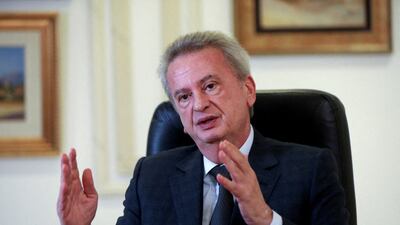A Lebanese judge has lifted a travel ban placed on central bank governor Riad Salameh, enabling him to travel to Paris for a hearing scheduled on May 16 as part of an embezzlement investigation.
Mount Lebanon prosecutor Ghada Aoun told The National she lifted the travel ban on Thursday, which she placed on Mr Salameh last year as part of a local investigation against the embattled central bank governor, after requesting the file from Investigating Judge Nicolas Mansour earlier on Thursday.
A person familiar with the matter told The National the decision was taken to prevent the governor from using the travel ban "as an excuse to avoid attending the hearing” in France.
At least six European countries are investigating alleged money-laundering at the central bank. Mr Salameh is accused of siphoning more than $330 million through his brother's company to purchase luxury properties in Europe.
A delegation of European judicial officials visited Lebanon twice this year to interview witnesses and collect evidence as part of a joint investigation.
During their latest visit in March, the investigative team, with France's Aude Buresi as its only judge, conducted a two-day hearing during which it spent eight hours questioning the governor.
With the indictment of Mr Salameh's partner Anna Kosakova, and most recently of Lebanese banker Marwan Kheireddine, which in French law is a significant step before an eventual prosecution, the France appeared to have taken the lead as the fastest-moving European investigation.
The French proceedings are still at the investigation stage, aiming to gather enough evidence to convince a judge to move forward with a trial.
Mr Salameh's hearing in France is an important step.
“It is not only a stage of gathering information, but also an opportunity to confront Mr Salameh's statements with the evidence presented,” said a lawyer close to the case, requesting anonymity.
The indictment of Mr Kheireddine in France is a positive sign for the case as it showed there is enough evidence to justify formal charges, the lawyer said.
“The logical progression of events would be for Mr Salameh to face indictment. If he fails to appear, an arrest warrant may be issued against him to Interpol,” said the lawyer.
Mr Salameh's lawyer in France, Pierre-Olivier Sur, did not respond to requests for comment. He told Reuters that he might challenge the hearing in France citing procedural grounds.
He had told the agency before Ms Aoun's move that his client may not be able to attend the hearing due to the travel restrictions.
Ms Aoun imposed a travel ban on Mr Salameh in January last year as a part of a related investigation into the acquisition of real estate in the Champs-Elysees in Paris by Ms Kosakova.
It was alleged that Mr Salameh had made the central bank pay for renting the Parisian properties for a decade at inflated rates.
Mr Salameh is scheduled to appear in Beirut on May 18 as part of the Lebanese proceedings related to the same case, a judicial source confirmed to The National.
The proximity of the two dates is “not an issue”, the source said.
Mr Salameh, his brother Raja and one of his assistants were charged with money laundering, embezzlement and illicit enrichment in February. The file was entrusted to Beirut first investigative judge Charbel Abou Samra, who will decide whether to file an indictment, which would lead to a trial.
Calls to Mr Salameh remained unanswered. He has repeatedly denied any wrongdoing.
He said he had never received any money from the central bank into his personal accounts.
Mr Salameh has not been charged in France.











